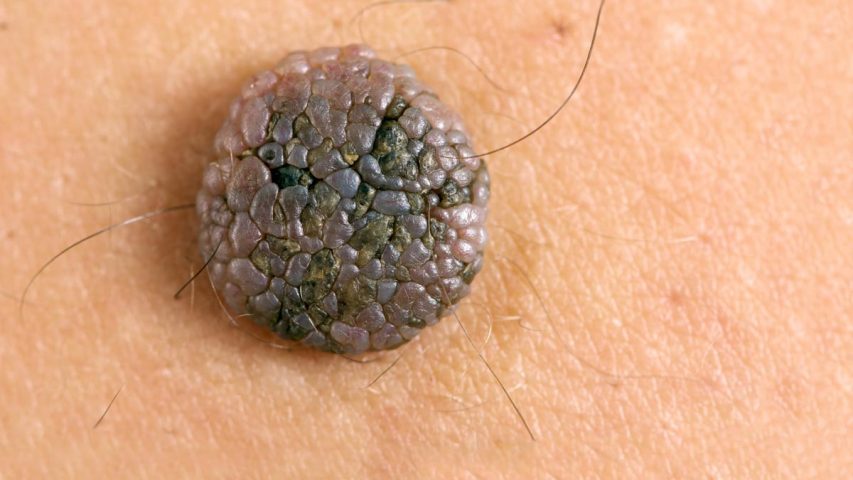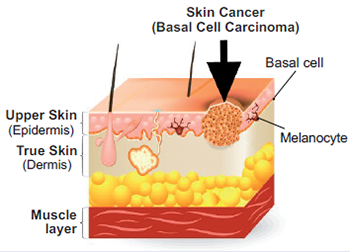- Have any questions? Contact us!
- info@dr-rath-foundation.org

The Benefits of Micronutrients for Healthy Skin and Collagen
October 4, 2017
Benefits of Micronutrient Synergy in Digestive Health
October 4, 2017The Benefits of Micronutrients in Non-Melanoma Skin Cancers


The basal cell carcinoma, the “white” skin cancer, originates from the basal cells of the upper skin (epidermis). It is one of the most common skin tumors. Studies of the Dr. Rath Research Institute demonstrate that micronutrients have a significant potential for the prevention and treatment of skin cancer.
Skin cancer is the most common of all types of cancers. While melanoma is the most feared skin cancer, non-melanoma skin cancers are far more common. The American Cancer Society estimates 73,000 Americans will be diagnosed with melanoma in 2015; however, there will be 3.5 million new cases of nonmelanoma cancers.
The most common risk factor for non-melanoma skin cancers has been an unprotected exposure to sunlight and ultraviolet (UV) rays over several years. This cancer typically occurs in older adults; however, it is also seen that increased use of tanning beds, chemotherapy, radiotherapy, prolonged immunosuppression and exposure to chemical carcinogens through food and water are increasing the chance of developing skin cancers. These factors, in addition to the unprotected sun exposure, are becoming more common contributors for skin cancers in children and young adults¹. The areas of the skin that are exposed to the sun, such as the face, ears, neck, lips and the backs of the hands and arms, are the most frequent sites for basal cell carcinoma.
Although there are many types of non-melanoma skin cancers, those originating from the squamous and the basal cells of the topmost layer of the skin (the Epidermis) are far more common than any other types. Approximately 80% of all nonmelanoma skin cancers are basal cell carcinomas. An important characteristic of basal cell skin carcinoma is that this cancer is usually local and rarely spreads to other organs. Yet it could cause local tissue destruction and it is known to recur frequently, requiring further medical check-ups and treatments. The repetitive surgical treatments to remove basal cell carcinomas are not only uncomfortable and expensive, but they may sometimes cause disfigurement requiring extensive plastic surgery. Moreover, non-melanoma skin cancers increase a person’s risk of developing other serious cancers including melanoma, breast, lung and prostate cancer.
The most common risk factor for skin cancer, exposure to ultraviolet sunlight, causes free radical damage in the skin cells leading to abrasive changes. The antioxidant properties of vitamin C combined with lysine, proline and other micronutrients, may be protective against skin cancer. Therefore, we investigated the effects of a specific micronutrient combination on skin cancer cell lines, both in vitro and in vivo. Our in vitro studies indicate that these micronutrients are effective in inhibiting the multiplication of cancer cells responsible for tumor growth and, in addition, their potential to use matrix metalloproteinase (MMP) enzymes to destroy collagen and invade the body. The MMP enzymes are essential mechanisms of metastasis. Likewise, we observed that dietary supplementation with the micronutrients suppressed the growth of the skin cancer cells in mouse models, and the developed tumors were well capsulated indicating reduced potential of their spread².
It is estimated that there was a 35% increase in the diagnoses of non-melanoma skin cancers between the years 2006 and 2012. In addition to protection from overexposure to the sun and other measures, micronutrient supplementation should be considered as an important added factor to reduce the chances of developing skin cancer.
Ref:
1. Khosravi H, et al., J Am Acad Dermatol. 2015;doi:10.1016/j.jaad.2015.08.007.
2. J. Cha, et al., Experimental Oncology 2011, 33(4):1-5



